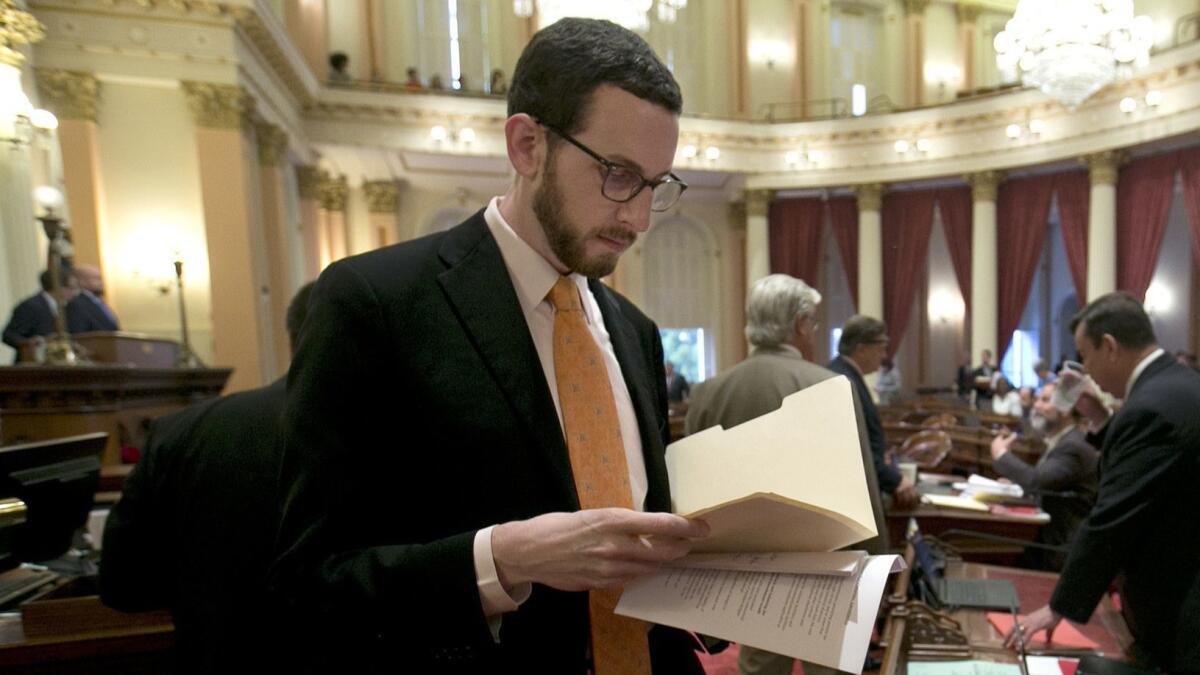Column: California’s plan to protect net neutrality will shield consumers from telecom bullies

Comcast, AT&T, Verizon and other big internet service providers must be wondering if they didn’t outsmart themselves by lobbying the federal government to kill network neutrality rules.
President Trump’s Federal Communications Commission chairman, Ajit Pai, served as the executioner last December. He and the Republican majority on the FCC reversed a rule that had been in place since 2015, prohibiting the big ISPs from using their market power to favor some websites and services over others.
Pai’s order created a vacuum in oversight of net neutrality that is getting filled by states. Washington state and Oregon already have enacted net neutrality laws, and governors in at least five states — Hawaii, New Jersey, New York, Montana and Vermont — have signed executive orders upholding the principle. The latest to take a crack at the issue is California, where the most comprehensive state measure to create net neutrality protections had its first hearing before the Senate Energy, Utilities, and Communications Committee on Tuesday.
ISPs have a lot of incentive to weaponize their power to harm competitors.
— Ernesto Falcon, Electronic Frontier Foundation
AT&T and a consortium of California ISPs sent lobbyists to the Capitol to decry the bill as a menace to consumers and a threat to the state economy. The opponents warn that the state bill is preempted by federal law, though since the FCC actually took itself out of the business of regulating network neutrality, that’s questionable.
“They will sue, they will raise every conceivable argument,” Sen. Scott Wiener (D-San Francisco), the bill’s sponsor, told me. “They have every right in the world to do that. But we think we have the right to protect consumers and businesses in the state.”
For those who haven’t followed the network neutrality debate, here’s a short primer. Network neutrality is the principle that ISPs, which own the “last mile” interconnection between the internet and your home or business, can’t use their position to block content they don’t like, charge providers more for a “fast lane” into the home or stifle providers offering services that compete with the ISPs’ own.
The issue has become more critical in recent years as ISPs have offered web-based services also offered by others, such as streaming movies, voice and video calls and bill payment. It became a simple matter for ISPs to steer their own subscribers to favored services, such as their own subsidiaries, by slowing, degrading or blocking rivals. And there were documented cases in which ISPs with market power over the home internet market did just that.
In 2015, then-FCC Chairman Tom Wheeler put through a rule giving the commission the authority to regulate such behavior. (In effect, he was reversing an action the FCC had taken in 2002, under President George W. Bush, that had tied its own hands on the issue.) Pai, a former lawyer for Verizon, called the 2015 rule a “regulatory sledgehammer” aimed at fixing a problem that should be left to the free market to address.
The ISPs have continued to maintain that net neutrality regulation is a solution in search of a problem. At Tuesday’s hearing, AT&T lobbyist Bill Devine said the bill’s supporters have not cited “a single unchecked violation of law to justify the need for this legislation.” He called the bill the product of “speculation that somebody, somewhere, sometime in the future might violate network neutrality rules.”
Well, as Hamlet’s Queen Gertrude might say, “the lobbyist doth protest too much.” AT&T itself has been accused several times of slowing or blocking web applications, in some cases where it had a clear competitive interest. Until late in 2009, for example, iPhone users couldn’t use the Skype voice and video calling service on AT&T’s 3G cellular network, but only on Wi-Fi. An AT&T spokesman told the Wall Street Journal at the time: “We have no obligation — nor should we have — to facilitate or subsidize our competitors’ businesses.”
In 2011, AT&T blocked Apple’s FaceTime app for subscribers to its unlimited data plan unless they changed to a costlier monthly data plan. AT&T says that it did so out of a legitimate concern that heavy FaceTime usage would overload its network, and that it relented after only four months.
Other ISPs have been caught abusing their position. Comcast, which owns NBC and Universal, has been a serial violator, drawing FCC discipline on more than one occasion. The FCC hasn’t always imposed stringent penalties, but anti-competitive behavior by ISPs is anything but speculative. “ISPs have a lot of incentive to weaponize their power to harm competitors,” says Ernesto Falcon, legislative counsel at the Electronic Frontier Foundation.
One method of doing so is known as zero-rating, which was a concern of Wheeler’s FCC and is a particular target of Wiener’s measure. In zero-rating, a wireless internet service provider exempts certain content from the data caps on a user’s account. Some services such as Netflix might obtain that preference by paying a fee; others may have it because they’re subsidiaries of the wireless provider.
ISPs assert that these arrangements’ popularity proves that they’re consumer-friendly, but they’re anything but. The problem is that they disadvantage any providers without the connections or the capital to be on the inside. The FCC in its 2015 order didn’t ban zero-rating outright, but said it would examine the deals on a case-by-case basis.
The commission soon moved against two zero-rating arrangements — AT&T’s “sponsored data” program, which favored providers that paid a fee, as well as DirecTV, which is owned by AT&T. In December 2016, the FCC informed AT&T that it had “reached the preliminary conclusion that these practices inhibit competition [and] harm consumers.” At the same time, the FCC warned Verizon that its FreeBee Data 360 offer, which included data exemptions for its own video service, “has the potential to hinder competition and harm consumers.”
“The FCC never voted on anything or banned zero-rating,” AT&T spokesman Steven Maviglio told me. This is true, but that’s not because the commission backed down on the merits.
“The FCC began to bring the hammer down in 2016,” Falcon notes. “What happened was that Trump became president, and Ajit Pai terminated these investigations.”
Wiener’s bill takes a more uncompromising approach to zero-rating. It doesn’t ban the practice entirely, but prohibits ISPs from taking pay for zero-rating. It would allow ISPs to exempt whole categories of content from data caps, but not to limit the exemptions only to certain providers within those categories.
“There are benign forms of zero-rating,” Wiener says. “If an ISP says no gaming sites will count against your internet usage, and it applies to all gaming sites and the sites don’t have to pay, that’s not prohibited. But if, let’s say, AT&T says, if you use our product it won’t count against your data, but if you use our competitor’s product it will count, that is anticompetitive, monopolistic behavior and it’s prohibited under our bill.”
The most absurd argument heard against the Wiener bill is that it will stifle the ISPs’ ability to raise money to upgrade their networks. In other words, consumers will suffer lousier service because the companies are so impoverished.
At the hearing, Barbara van Schewick, director of Stanford Law School’s Center for Internet and Society, succinctly put the kibosh on this notion. She observed that from 2015 through 2017, Comcast repurchased $16 billion of its own stock. “If they took this money they could deploy a fiber network to 80 to 160 million people in the United States.” She could have gone further: In 2017, Comcast, Verizon and AT&T earned a combined profit of $82.3 billion on revenues of more than $371 billion.
What really allows big ISPs to flout network neutrality in their quest of higher profits is a lack of competition, Van Schewick pointed out. About half of all Americans have only one ISP to choose from, and this near-monopoly allows the incumbents to underbuild their networks, squeeze providers for fast-track and zero-rating fees, and pitilessly pick their subscribers’ pockets.
When the free market doesn’t work because it doesn’t exist, that’s where government regulation is most needed. When federal regulators decide to not do their jobs, the states have to step in. Now that the big ISPs got what they wanted in Washington, D.C., it’s up to Sacramento to show they should have been more careful about what they wished for.
Keep up to date with Michael Hiltzik. Follow @hiltzikm on Twitter, see his Facebook page, or email [email protected].
Return to Michael Hiltzik’s blog.



